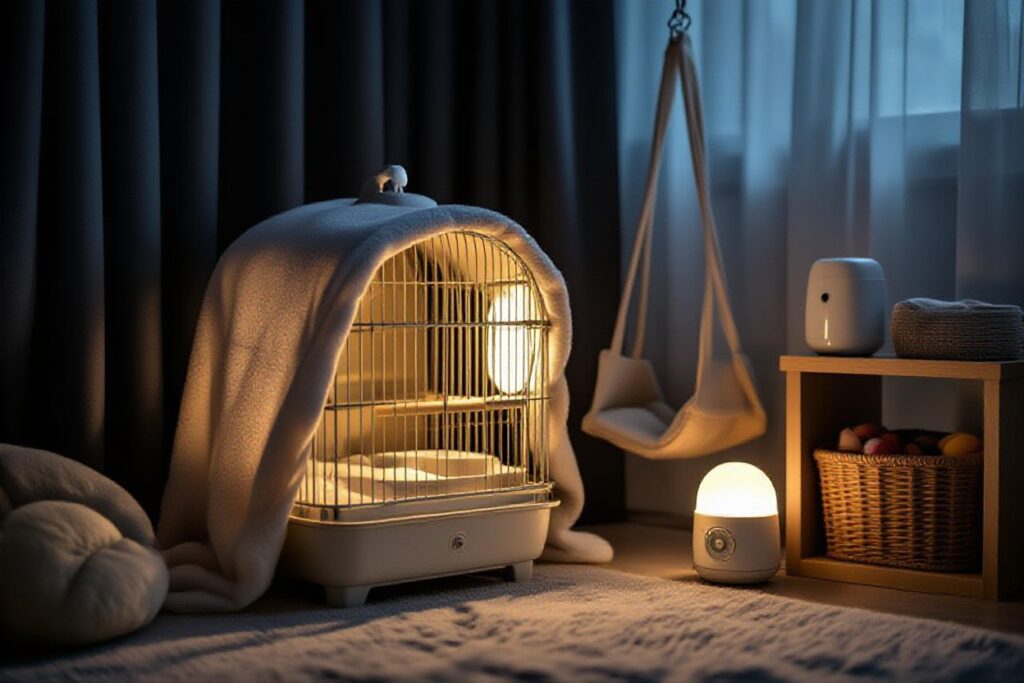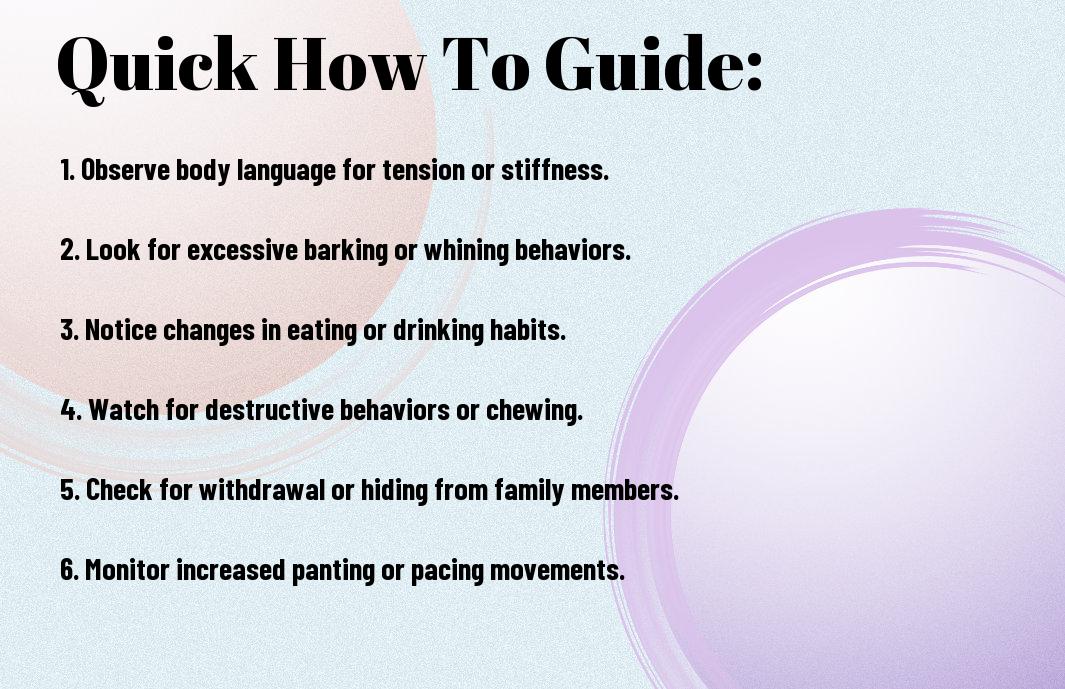Many pet owners find themselves facing the challenge of caring for a bird that is easily frightened by loud noises. This fear can lead to stress and anxiety in your feathered friend, affecting their overall well-being. In this guide, you will learn effective strategies to create a tranquil environment, gradually desensitize your bird, and provide the reassurance they need to feel safe. By implementing these techniques, you can help your avian companion thrive despite the noisy world around them.


Understanding Fear in Birds
While it may be surprising, birds are susceptible to fear, much like other animals. Their instinctive reactions to perceived threats are rooted in their evolutionary history. Understanding your bird’s fear is crucial for effective management of their anxiety, especially in relation to loud noises that can occur in a household or environment. By recognizing the various factors that contribute to your bird’s fear response, you can create a more nurturing and safe atmosphere that minimizes stress for your feathered friend.
Common Causes of Fear
If you notice that your bird reacts strongly to certain stimuli, it’s important to identify the common causes of fear. Many birds may be apprehensive about loud noises, such as thunderstorms, vacuum cleaners, or even the sound of television. These loud sounds can trigger a sense of danger, causing your bird to panic or seek refuge. Additionally, changes to their environment, such as moving to a new home or the introduction of new pets, can increase fear levels in birds, as they are creatures of habit and thrive on routine.
The Impact of Loud Noises on Birds
Noises can have a profound impact on your bird’s mental health. The stress caused by exposure to loud sounds can lead to behaviors such as excessive vocalization, feather plucking, or even self-harm. Birds possess acute hearing, making them particularly sensitive to sudden or loud noises. In severe cases, prolonged exposure to distressing sounds can result in long-term psychological effects, affecting their overall wellbeing and quality of life.
This highlights the importance of creating a quieter, calmer environment for your bird. Implementing measures such as providing a safe space where they can retreat during noisy events, using soft background music to mask sudden loud sounds, or actively managing your household noise levels can help mitigate your bird’s fear. Additionally, it’s crucial to monitor your bird’s behavior closely, as early intervention can prevent the escalation of fear-related issues, ultimately ensuring a happier and healthier life for your avian companion.

How to Identify an Afraid Bird
Assuming you have a pet bird, it’s crucial to understand its behavioral cues to gauge its emotional state. Birds, like many animals, can experience fear due to various factors, including environmental changes or loud noises. By identifying the signs of a frightened bird, you can take necessary steps to soothe its anxiety and create a more comfortable habitat.
Signs of Fearful Behavior
While observing your bird, pay attention to specific body language that indicates fear. Common signs include puffing up of feathers, increased vocalizations, or retreating to the back of the cage. Another sign to be mindful of is if your bird appears less active, spending more time in hiding or avoiding interaction with you and its environment. This behavior suggests that your bird may be feeling threatened or uncomfortable, requiring immediate attention.
Additionally, look for more subtle indicators such as dilated pupils or erratic movements. If your bird frequently flaps its wings vigorously or tries to escape when faced with loud noises, these are strong signs of stress. Understanding these signs will enable you to respond appropriately and reassure your feathered friend.
Monitoring Your Bird’s Reactions
Monitoring your bird’s reactions is important in determining how it copes with stressors, especially loud noises. Start by observing its behavior during these events. You might notice your bird becoming startled or trying to escape when exposed to sudden sounds like thunder, vacuum cleaners, or even raised voices. Keeping a log of these events might help you identify patterns in your bird’s responses and any potential triggers.
Reactions can vary significantly between individual birds, making it important to remain observant. A frightened bird may either become unusually quiet or exhibit hyperactive behaviors as a defense mechanism. Noting your bird’s specific reactions to loud noises, such as becoming silent or overly agitated, will give you a clearer understanding of what makes it fearful. This knowledge is crucial for implementing effective strategies to alleviate its anxiety and promote a sense of security in your home.
Tips for Managing Loud Noises
Once again, handling a bird that’s afraid of loud noises requires consistent patience and understanding. Here are some effective tips for managing the situation:
- Create a conducive environment that minimizes exposure to loud noises.
- Provide safe spaces for your bird to retreat when they feel frightened.
- Gradually desensitize your bird to loud sounds at their own pace.
- Introduce soothing sounds or music to create a calming atmosphere.
- Try to engage your bird with gentle play and distraction during surface-level noise events.
Creating a Safe Space
Even in a noisy environment, it is important for you to establish a safe space for your bird. This space should be quiet, away from typical loud noise sources, and contain familiar items like their food, water, and favorite toys. Using blankets or bird tents can also create a cozy atmosphere where your bird feels secure and protected from sudden disturbances.
Additionally, consider ensuring that the safe space is enriching. Birds thrive in environments that stimulate their minds and bodies. Adding perches, interactive toys, and even calming visuals can help your bird feel more at ease. This sense of safety can considerably reduce their anxiety when faced with loud noises.
Gradual Desensitization Techniques
Tips for **gradual desensitization techniques** involve exposing your bird to recorded sounds that are similar to the loud noises they fear, but at lower volumes. You can begin with sound levels that are barely noticeable, slowly increasing the volume over time as your bird becomes more comfortable with each increment. This method allows your bird to adjust at their pace and builds their confidence in their ability to handle the noises.
Loud noises can trigger a fear response in your bird, which means it’s vital that you proceed with utmost care. Consider incorporating positive reinforcement, such as treats or praise, during these sessions to create positive associations with the sounds. This proactive approach can help mitigate fears and eventually result in a more resilient pet.
Using Soothing Sounds and Music
Gradual introduction of soothing sounds or music can significantly improve your bird’s comfort during loud events. Nature sounds or soft instrumental music can effectively mask unpleasant noises without overwhelming your feathered friend. Set a calming atmosphere by playing these soothing sounds consistently, particularly during times when loud noises are likely to occur.
Sounds that have a gentle, rhythmic quality can provide a calming effect for your bird, which may help in reducing their anxiety. Experiment with different types of music or sounds to see which ones your bird responds to positively. Creating a serene auditory environment can be a game changer in helping your pet cope with the stress of sudden loud noises. Recognizing your bird’s comfort levels and preferences will guide you in implementing these effective strategies.
Factors to Consider for Long-Term Solutions
After addressing the immediate fears of your bird, it’s vital to focus on long-term solutions to ensure your pet feels safe and secure in its environment. Managing a bird that’s afraid of loud noises involves various strategies, and understanding the factors that contribute to effective management can help you create a stable atmosphere for your feathered friend. Here are a few factors to consider:
- Understanding your bird’s species and inherent traits
- Identifying the specific sources of loud noises
- Creating a safe space for your bird
- Incorporating enrichment activities to reduce stress
- Establishing a consistent routine to foster stability
Assume that by considering these factors diligently, you will be more equipped to provide a favorable environment that promotes your bird’s well-being over time.
Environmental Modifications
Assuming that you have already noticed your bird’s reactions to loud sounds, environmental modifications play a crucial role in long-term management. You can begin by creating a designated quiet area in your home where your bird can retreat when stressed. This area should be equipped with its favorite perches, toys, and access to natural light. Ensuring this space is far from the sources of noise, such as traffic or household appliances, will help minimize the stress your bird may encounter.
Additionally, using sound-dampening materials like curtains or rugs can significantly reduce the volume of background noise. Consider placing your bird’s cage in a location that is quieter and away from the hustle and bustle of your daily activities. Integrating natural sounds or white noise machines can also create a soothing environment for your bird, helping it feel more relaxed and less anxious about sudden loud disturbances.
Training Techniques for Better Adaptation
Consider implementing positive reinforcement training to help your bird adapt to loud noises gradually. Start by exposing your bird to soft sounds at lower volumes, gradually increasing the intensity as your bird becomes more comfortable. Use treats and praise to create a positive association with these noises. This gradual exposure can help desensitize your bird to loud sounds, making it less fearful over time.
Another effective strategy is to engage in regular training sessions that focus on building your bird’s confidence. Incorporate fun and stimulating activities, as these can provide mental enrichment and distract your bird from its fears. Pair these sessions with gentle exposure to sounds in a controlled manner. Keep in mind, serious attention to your bird’s emotional needs is fundamental; a relaxed, happy bird is far less likely to react negatively to unexpected loud noises. Consistent training will foster a secure bond between you and your pet, paving the way for a calmer and more resilient bird.
FAQ
Q: What are some common signs that my bird is afraid of loud noises?
A: Some common signs that your bird is afraid of loud noises include excessive flapping, hiding, vocalizations like screaming or squawking, feather plucking, and changes in eating habits. You might also observe your bird becoming more withdrawn or showing signs of stress, such as puffing up their feathers or biting at their cage bars. It’s important to pay attention to these signs so you can address their fear appropriately.
Q: How can I create a calmer environment for my bird to reduce their fear of loud noises?
A: To create a calmer environment for your bird, consider implementing a few strategies. First, place the bird’s cage in a quieter area of your home, away from sources of loud noises like the television, traffic, or loud conversations. You can also provide your bird with safe, sound-buffering materials like blankets or curtains to help muffle noise. Additionally, using white noise machines or soft background music can help mask sudden loud sounds. Regularly engaging with your bird through gentle interaction can also help build their confidence in a safer environment.
Q: What training techniques can I use to help my bird cope with loud noises?
A: Training your bird to cope with loud noises can be achieved through desensitization techniques. Start by introducing your bird to recorded noises at a very low volume, gradually increasing the volume over time as they become more comfortable. Always pair the exposure to loud sounds with positive reinforcement, such as treats or praise, to help your bird associate those sounds with something enjoyable. Additionally, practicing regular training sessions in a calm environment can help improve their overall confidence and reduce their fear response to loud noises.










